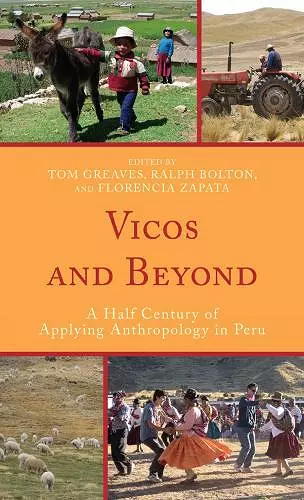Vicos and Beyond
A Half Century of Applying Anthropology in Peru
Tom Greaves editor Ralph Bolton editor Florencia Zapata editor
Format:Hardback
Publisher:AltaMira Press
Published:16th Nov '10
Currently unavailable, and unfortunately no date known when it will be back

This collection explores the Vicos Project, a pioneering effort by anthropologists to improve community life in a Peruvian village, revealing diverse perspectives and insights.
From 1952 to 1962, a group of anthropologists funded by Cornell University aimed to leverage their knowledge to enhance the lives of residents in Vicos, a small village in the Peruvian Andes. This collection critically assesses the methodologies and outcomes of the renowned, and at times controversial, Vicos Project. Under the guidance of Professor Allan Holmberg, Cornell University leased the Hacienda Vicos, an agricultural estate that housed approximately 1,800 Quechua-speaking peasants. Between 1952 and 1957, Holmberg and his team implemented various social, economic, and agrarian reforms while fostering community management of the estate by local residents.
By the conclusion of the second lease in 1962, significant political pressure was exerted on a hesitant national government, ultimately leading to the sale of Vicos to its inhabitants. Holmberg's dual objectives for the Vicos Project involved facilitating community ownership of their land and studying the unfolding process, which contributed to a deeper understanding of cultural change within anthropology. He coined the term participant intervention to describe this innovative approach.
Despite the extensive existing literature on Vicos, Vicos and Beyond presents fresh insights, with much of its content appearing in print for the first time. The contributing authors express differing viewpoints on critical aspects of the Vicos Project, including the intentions of the project personnel and community members, as well as the most valid interpretive frameworks. These varying perspectives highlight the significance of the Vicos Project in contemporary applied anthropology and underscore the complexity of interpreting historical events. Some chapters draw comparisons between Vicos and other initiatives in the southern Andean highlands, while others delve into recent developments in Vicos itself, providing a comprehensive understanding of its impact on Andean anthropology and the field of anthropology as a whole.
Considered a groundbreaking example of applied anthropology, the Cornell-Peru Project (CPP, 1952-62) is now mostly forgotten. Editors Greaves (emer., Bucknell Univ.), Bolton (Pomona College), and Zapata (The Mountain Institute) have assembled a volume that is part detailed history by surviving members of the project and part evaluation of it by anthropologists who were not part of it. Chapters by researchers describing similar projects and by anthropologists discussing the current state of Vicos round out the book. No consensus emerges as to the CPP's success or failure, but each contribution provides an important perspective on the project, the role of applied anthropology then and now, and the changes in Peruvian society since the 1950s. Graduate students and researchers interested in the relationship between anthropology and development, or the history of the discipline in Latin America, will find the book useful. Undergraduates will find the specificity of the contributions daunting, but those by Jason Pribilsky, Bolton, and Zapata discussing, respectively, anthropology in the era of Cold War politics, the continued relevance of applied anthropology, and a specific case of a cultural heritage program provide treatments accessible to advanced undergraduates. Summing Up: Recommended. Graduate students, researchers, faculty. * Choice Reviews *
Vicos and Beyond is a thoughtfully put-together compilation on the contentious community development project run by Cornell in highland Peru in the mid-twentieth century. . . .[The book] challenge[s] methodological and theoretical paradigms on development work and make the collected works reviewed here invaluable to anthropologists struggling through the labyrinthine intricacies of applied collaborations today. . . .Vicos and Beyond is a keen exploration of the historiography of Andean applied anthropology that has brought novel and much-needed material from Peruvianists to the discipline-wide discussion on changes in applied research. It is thus fitting that the concluding portion of the volume points to a future in collaborative applied work where we include the stories, interpretations, and perceptions of the subjects who participate in research projects. * Collaborative Anthropologies *
Full of pros, cons, and new informative details, these insiders' essays offer fresh perspectives on Cornell's audacious social experiment. -- Dwight B. Heath, Brown University
ISBN: 9780759119741
Dimensions: 239mm x 162mm x 27mm
Weight: 723g
358 pages